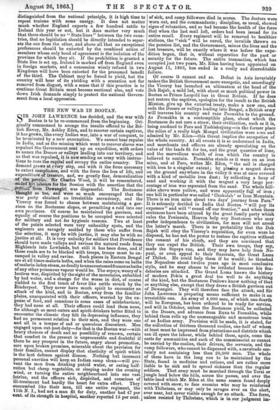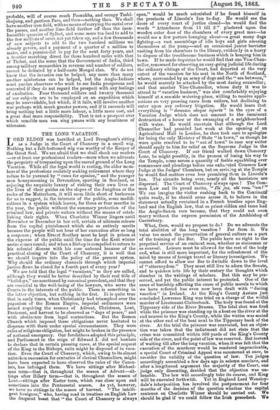THE NEW WAR IN BOOTAN.
SIR JOHN LAWRENCE has decided, and the war with Bootan is to be re-commenced from the beginning. Ori- ginally commenced to avenge the insults offered to the Bri- tish Envoy, Mr. Ashley Eden, and to recover certain captives, it has grown, like every Indian war, into a war of conquest, to be terminated by a new annexation. We cannot bear repulse in India, and as the mission which went to recover slaves was repulsed the Government sent up an expedition, with orders to annex the Dooars or valleys leading into our territory, and as that was repulsed, it is now sending an army with instruc- tions to raze the capital and occupy the entire country. The demand grows at eiery step, and with it the force necessary to extort complit,fice, and with the force the loss of life, and expenditure of treasure, and, we greatly fear, demoralization of the people. Sir Charles Wood, it will be remembered, ended hi, labours for the Session with the assertion that the re,truir from Dewangiri was disgraceful. The Bootanese thought so too, and were so much encouraged that the war party obtained an irresistible ascendency, and the Viceroy was forced to choose between maintaining a gar- rison on the Bootanese slopes, or permitting a raid into our own provinces. Of course he maintained the garrison, and equally of course the positions to be occupied were selected for military and not for hygienic reasons. Two at least or the points selected were very unhealthy spots, and the engineers are savagely scolded by those who suffer from the selection, it may be with justice, it may also be with no justice at all. It is very unlucky for soldiers that Providence should have made valleys and ravines the natural roads from Highlands into Lowlands, but still it has been done, and if those roads are to be blocked with troops, troops must be en- camped in valley and ravine. Such places in Eastern Bengal are at all times malaria baths, and when the rains come on baths of malaria-laden steam, as deadly to unaccustomed frames as baths of any other poisonous vapour would be. The sepoys, weary of a lootless war, dispirited by the sight of the mountains, enfeebled by bad water, and a change for the worse in diet, of course yielded to the first touch of fever like cattle struck by the Rinderpest. They never have much spirit to encounter an attack of the kind, and in Bootan, away from the familiar plains, unacquainted with their officers, worried by the ex- pense of food, and conscious in some cases of misbehaviour, they had none at all. Their officers could lend them none, for although as meat-eaters and spirit-drinkers better fitted to encounter the climate they felt its depressing influence, they had no permanent relation to their men, and they were one and all in a temper of sad or querulous discontent. Men 'engaged upon out-post duty—for that is the Bootan war—with heavy chances of death and no possibility of renown, certain that comfort in the present is unprocurable and doubtful if there be any prospect in the future, angry about promotion, sore upon broken promises, miserable about the provision for their families, cannot display that elasticity of spirit which is the best defence against disease. Nothing but incessant personal exertion will keep an Indian camp clean—will pre- vent the men from drinking putrid water, or eating half- rotten but cheap vegetables, or sleeping under the evening wind, or turning the entire neighbourhood into one vast latrine, and the officers sick, dispirited, and conscious of ill-treatment had hardly the heart for extra effort. They succumbed like their men, till ene entire regiment, the 11th N. I., bad not a man fit for duty, another had 47 per Lent. of its strength in hospital, another reported 15 per cent. of sick, and camp followers died in scores. The doctors were worn out, and the commandants; discipline, as usual, showed signs of relaxation, and so bad became the health of the force that when the last mail left, orders had been issued for its entire recall. Every regiment will be removed to healthier stations, the " sick " will be cured, the invalids thrown on the pension list, and the Government, minus the lives and the lost treasure, will be exactly where it was before the expe- dition began, that is, without reparation for the past or security for the future. The entire transaction, which has occupied just two years, Mr. Eden having been appointed on August 11, 1863, has ended in a costly and discreditable failure.
Of course it cannot end so. Defeat in Asia invariably makes the British Government more energetic, and accordingly the Viceroy has launched an ultimatum at the head of the Deb Rajah, a mild lad, with about as much political power in Bootan as Prince Leopold has in Great Britain. If he does not restore the captives, apologize for the insult to the British. Mission, give up the extorted treaty, make a new one, and cede the Dooars or valleys leading into Bengal, a British army will traverse his country and raze Poonakha to the ground. As Poonakha is a contemptible place, about which the Bootanese do not care a straw, their civilization, such as it is, being confined to Paro and Tashishujung—in the former place the relics of a really high Mongol civilization were seen and admired by Mr. Eden—this threat implies the occupation of the whole country. At all events it is so uuderstood in India, and merchants and officers are already speculating on the value of the lands fit for tea, and the great quarries of lime, and the marvellous wealth of iron which the country is believed to contain. Poonakha stands as it were on an iron mine, and at Paro, writes Mr. Eden, " the soil is charged with iron to a singular extent ; by planing a magnet down on the ground anywhere in the valley it was at once covered with a kind of metallic iron dust ; by collecting a heap of sand and working it with the magnet a very largo per- centage of iron was separated from the sand. The whole hill- sides above were yellow, and were apparently full of iron ; one hill in particular was called Chakolah ' or Iron Mountain. There is an iron mine about two days' journey from Paro." It is solemnly decided in India that Bootan " will pay its expenses" and will " round off our frontier," and when those sentences have been uttered by the great family party which rules the Peninsula, Heaven help any Bootanese who may prefer independence to civilization, for man will not arrest the latter's march. There is no probability that the Deb Rajah will obey the Viceroy's requisition, for even were he disposed, he has not the power to restore the captives without the consent of his chiefs, and they are convinced that they can expel the British. Their own troops, they say, made the Sepoys run, and they may have help from Ne- paul, or even appeal to their Suzerain, the Great Lama of Thibet. He could help them if he would ; he thrashed the Nepaulese about twelve years ago in most conclusive style, and he may choose to be irritated because his feu- datories are attacked. The Grand Lama knows the history of modern Pekin a great deal too well to do anything of the kind, but the Bootanese Penlows know nothing of that or anything else, except that they drove a British garrison out of Dewangiri. They will therefore face the attack, and Sir John Lawrence is preparing means sufficient to make it an irresistible one. An army of 4,000 men, of which one-fourth will be European, has been ordered to be ready for service, and will in October, unless the Bootanese yield, be collected in the Dooars, and advance from Buxa to Poonakha, while behind them rolls up the unmanageable and monstrous train of an Indian army. Provision will be made, it is stated, for the collection of thirteen thousand coolies, one-half of whom at least must be impressed from plantations and districts which can ill spare the labour, while behind them, again, come the carts for ammunition and such of the commissariat as cannot be carried by the coolies, their drivers, the servants, and the camp followers, who cannot be dispensed with, a cavalcade cer- tainly not containing less than 20,000 men. The whole of these have in the long run to be maintained by the State, found in medicine and rations, and are rather more liable to be sick and to spread sickness than the regular soldiers. That army must be marched through the Terai or jungle land below the hills, across the passes, and over the table-land which Mr. Eden at the same season found deeply covered with snow, to face enemies who may be reinforced with Thibetans, or may only be savages ever on the alert, ever near, but never visible enough for an attack. The force, unless resisted by Thibetans, which is in our judgment im- probable, will of course reach Poonakha, and occupy Testa- shujung, and garrison Paro, and then—nothing then. We shall have another iron field, with no means of carrying the metal over the passes, and another lime-field further off than the inex- haustible quarries of Sylhet, and some more tea-land to add to the few millions of acres not yet taken up, and a few thousands of new subjects to add to the two hundred millions we already govern, and a payment of a quarter of a million to make, and a pension-list to pay for the next forty years, and a frontier marching direct for three hundred miles with that of Thibet, and the sense that the Government of India, third among military monarchies in revenue and number of soldiers, cannot be defeated by a half-caste Mongol clan. We do not know that the invasion can be helped, any more than many another misfortune can be helped, but the Anglo-Indians must pardon observers who wish to see India prosperous and contented if they do not regard the prospect with any feelings of exultation. Four thousand soldiers and twenty thousand of our subjects are to be employed on an expedition which may be unavoidable, but which, if it fails, will involve another war perhaps with much greater powers, and if it succeeds will bring nothing but a little more labour, a little more cost, and a great deal more responsibility. That is not a prospect over which sensible men can sing paeans with any heartiness of utterance.































 Previous page
Previous page